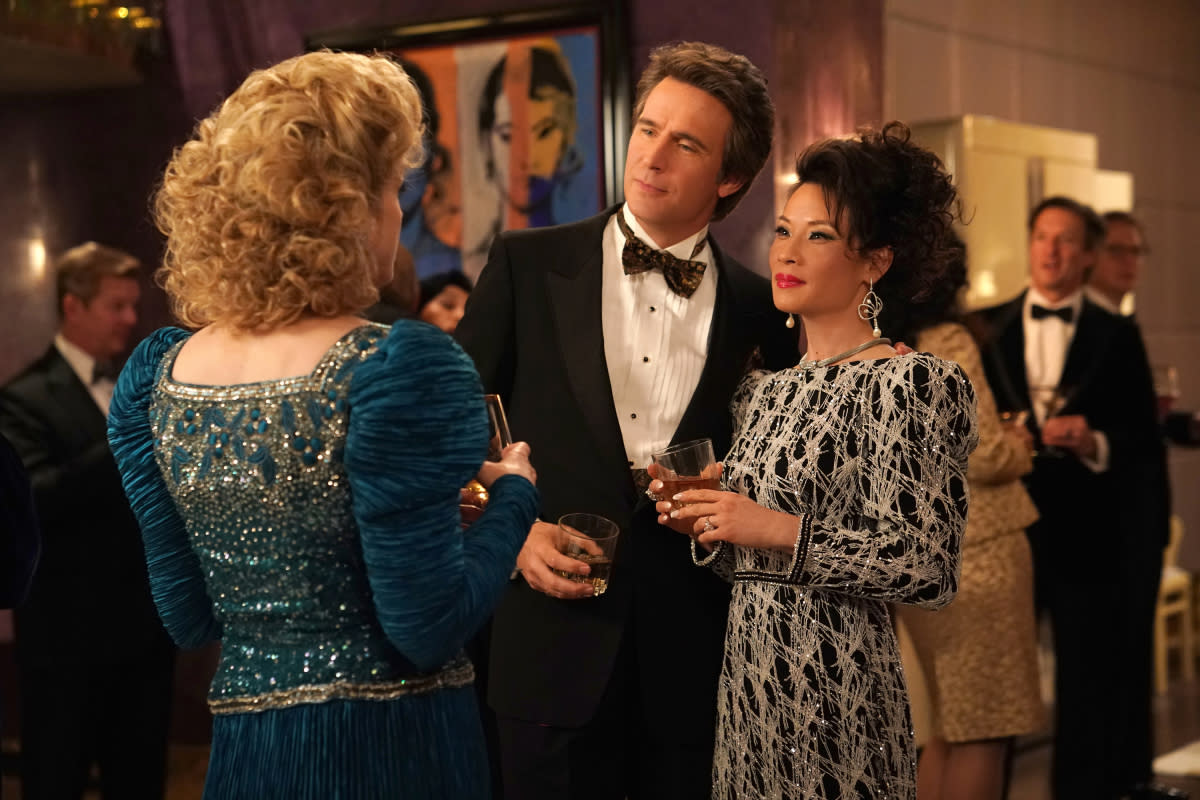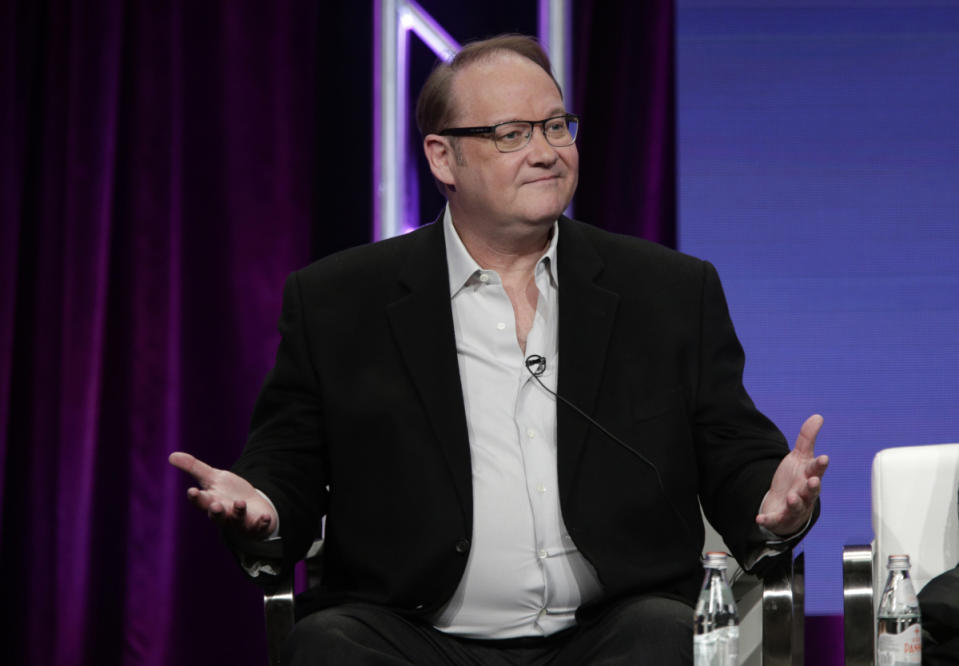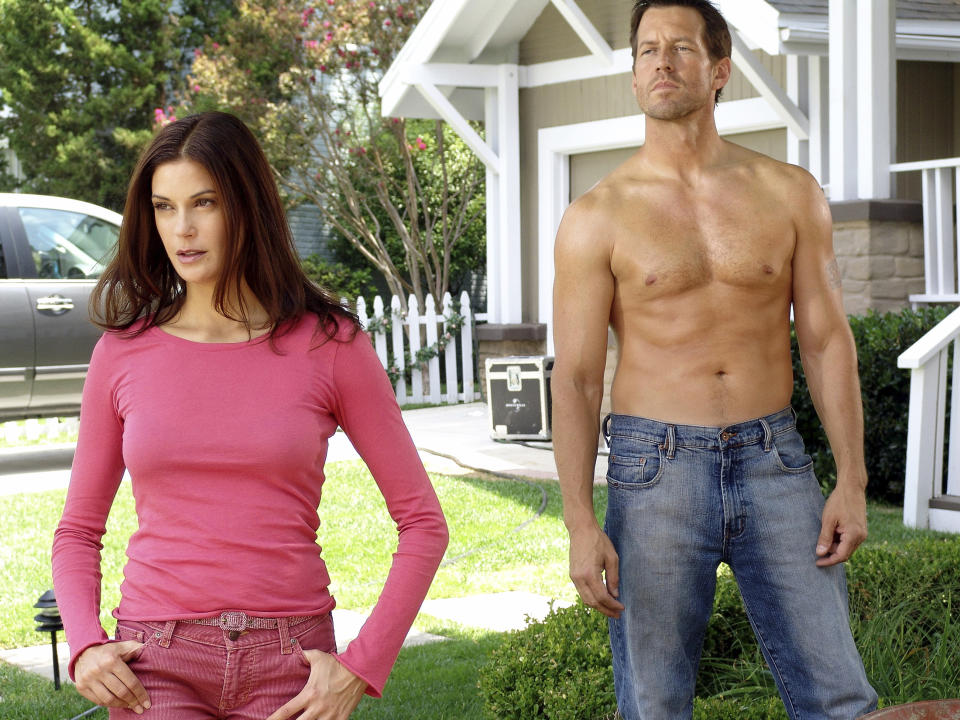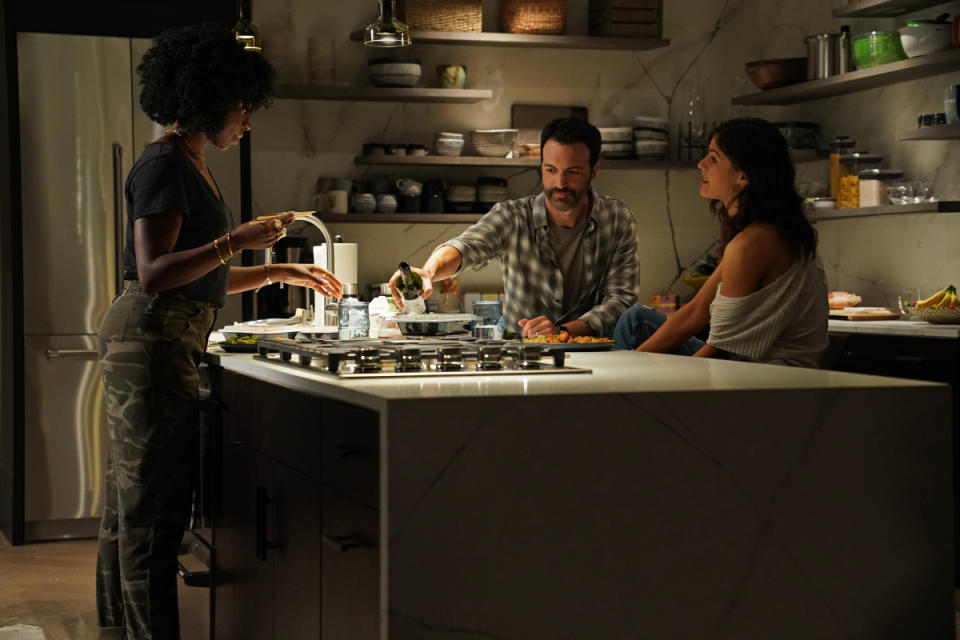Marc Cherry on how 'Why Women Kill' tells the stories of 'what women should be and what marriage should look like' in the '60s, '80s and present day

Marc Cherry isn’t just the creator and executive producer of the new CBS All Access series, Why Women Kill: He’s also a character on the show … kind of. The Desperate Housewives mastermind conceived of his new series as a time-hopping portrait of three different women in three very different decades. Ginnifer Goodwin plays Donna Reed-esque housewife Beth Ann in 1963, while Lucy Liu goes full Dynasty as 1984-era socialite Simone and Kirby Howell-Baptiste’s Taylor enjoys a very 21st century open marriage with Reid Scott’s Eli in the present day.
What unites these women — apart from the fact that they inhabit the same house, albeit decades apart — is that they each have good reason to contemplate the deaths of the men in their lives. Beth Ann’s distant husband, Rob (Sam Jaeger) has drifted into an affair; Simone’s spouse, Karl (Jack Davenport), is about to be forced out of the closet, threatening their social status; and Taylor isn’t thrilled that Eli is making eyes at her girlfriend, Jade (Alexandria Daddario).
The other thing that the trio have in common is that they share the same neighbor, who lives close to the house and witnesses the tragedies that befall its inhabitants across eras. “That character is absolutely my surrogate,” Cherry says, who was born in 1962. “I had to sit there and do the math to figure out exactly how old he would be in every single scene. What’s so amazing to me is that the realities of life and marriage in those times feel so different, but when I think about it, it’s only been the blink of an eye since I was born. I mean, I feel like I haven’t been around that long!”
The personal connection that Cherry feels to the material extends to the roles of Beth Anna and Simone, who he modeled after his own mother’s journey. “In 1963, my mother had a one-year old and she lived in a nice home in Huntington Beach, California. By the 1980s we were in Fullerton, and she was wearing pearls and she and my father made sure people knew that we were upper middle class. They were conservative and bought into all the Reagan materialism of the era. The modern day is more reflective of my own life, because I have friends who are in open marriages, so I’ve come to know a lot about that. So the eras of the show speak to my parents’ marriage, and then my own experiences. All of that poured out onto the page.”
In a bit of timing that Cherry swears is coincidental, Why Women Kill is premiering on CBS All Access on Aug. 15, which happens to be his parents’ 60th wedding anniversary. “They were married on Aug, 15, 1959,” he says. “They told me the premiere date, and I went ‘Aug. 15? Wait a minute!’” Yahoo Entertainment spoke with Cherry about leaving the network world behind for the brave new world of streaming (bring on the F-bombs!) and how Season 2 will be both different — and the same — as Season 1.

Yahoo Entertainment: I enjoyed the way the show jumps between eras in each episode in the space of a single cut. The way you collapse time is fun to watch.
Marc Cherry: Yeah! As a writer, I can say that most of those transitions were mine, although Marc Webb directed the first two episodes, and he came up with a couple of fun ones by himself. You have to be elegant with the edits, to make the three storylines feel of a piece. As we go on with the show, we don’t worry about it as much because we’ve already introduced the characters and they feel of a piece. But I definitely wanted to try for elegance starting out.
It also makes the house feel more like a character: You get to see how it changes with each decade and couple.
Our production designer had a great time! [Laughs] It was like, "One house, three decades — go." He was just thrilled, and I got to learn a lot about the color palettes of the various eras in terms of the kinds of colors that were in use, and all of that. Especially in the garish ‘80s; that was a lot of fun!

The ‘60s storyline feels very influenced by Douglas Sirk, whose movies have informed our memories of that time. Is he someone who inspired you?
I love that you bring up Sirk because I absolutely feel some kind of kinship with him. The themes that he was attracted to in storytelling absolutely motivate me as well: the interior lives of women in seemingly beautiful surroundings, but who are confronted with the carnage of their personal lives. The themes he deals with are the things that attract me as well. The other principles I used for these three characters were the depictions of women on TV. In the early ’60s, we were holding up Donna Reed and Harriet Nelson as iconic characters that women should aspire to be. You know, graceful and wearing pearls with perfect combs, telling mildly amusing incidents to their husbands and their kids.
And then when we get to the ’80s, we're in this world of glorious excess, where the women have got big hair and big shoulder pads, and they wear amazing gowns. There's tons of fun drama, but the women have come into a power of their own, and they're not afraid to express themselves. And then you have the modern-day woman who has choices that her ancestors couldn't even begin to imagine. You know, “I can have my male husband, but also a female lover, and I can be a feminist lawyer that comes home to a sloppy house, and it doesn’t matter that it’s sloppy.” I chose carefully from these three decades, because that's what the decades were telling us about what women should be and what marriage should look like.

After Simone discovers her husband’s secret, she’s tempted to start sleeping with a teenager, played by Leo Howard. You explored a similar storyline on the first season of Desperate Housewives with Eva Longoria and Jesse Metcalfe in 2004. Is that a less shocking relationship to depict now?
On Desperate Housewives, Jesse was 25 when he played John and Eva was 29 when she played Gabrielle. So even though we played Jesse as younger than 25, there was really only a four-year age difference. Here, Leo is 21 and Lucy is 50, even though we play Simone as around 45. So this felt far more dangerous for me to do. Also, because of recent societal attitudes towards this issue, it felt a touch more dangerous to have her react to the news that her husband's gay by having a kind of age-inappropriate affair with her best friend's son. So in a weird way, even though I had traveled some of this territory before, I felt it was different because the age difference was greater, and it was also a commentary upon the times, because I think people did that sort of thing and didn't think about it as much. That was part of what I wanted to do with this show: depict people doing things and reminding viewers that we may raise our eyebrows now, but back then this was how it was done. That's part and parcel of this concept.
Desperate Housewives was also a network TV show, whereas Why Women Kill is on a streaming service. Did you find you were able to push the envelope a little bit more or did you try to avoid doing that as a creative challenge to yourself?
In terms of the restrictions on a broadcast network, some of them I understand and some I thought were silly. And I will admit that there's a 10-year-old boy in me who delighted in being able to throw an F-bomb or two into this show. I can certainly write without profanity, but there are times when I go, “Oh, I get to use the word I really want to use!” [Laughs]
I think the biggest thing that a streaming service provides you is the amount of time with which you have to plot your show. For me, that’s why the broadcast networks are in trouble: There is a better product being made now, because [streaming services] have literally changed how the products are made. They have the money and the time to give people so much more thoughtful programming. I liken the experience of executive producing 23 episodes a season — which is what we did with Desperate — to being on an assembly line. The product is going, and there's only so much nuance you can add to it, because you've got to churn out the episodes. The next one's due, the next one's due. Whereas I feel more like a craftsman when I'm only being asked to do 10.

With Why Women Kill, I had already written the pilot before the show was even picked up, so I've only had to do nine episodes since we started writing. There's a level of attention to detail and emotional nuance that I just didn't have the time for [on Desperate Housewives]. Not that everything's perfect, because nothing ever is, but I just feel so much better about the work. What every writer in Hollywood right now must be feeling is, "Oh my God, I'm allowed to tell the stories in the amount of time they need to be told, and I don't have to come up with a model that you can get 150 episodes out of." Some stories really only need 10 or 20 episodes to be done! I think that's why we're living in a golden age of television: They've literally changed how the sausage is made, and that's why we're getting better sausage.
To that point, you’ve mentioned that if Why Women Kill gets picked up for a second season, it will tell a different story — sort of like what Ryan Murphy has done with American Horror Story.
Yeah, stylistically Season 2 will be the same: I will still tell these three alternate narratives all dealing with women and murder, but it'll have a different way in. If I'm so lucky as to have another season, I've got a way to do it so that the fans will feel the connection — it’ll be the same tone that they've fallen in love with, and I hope to use some of the same actors. Because Lord knows I've enjoyed this cast so very much, so hopefully I'll get the chance to build my own little repertory company. I was jealous that Ryan Murphy got to institute that [with American Horror Story] and people got to see that it worked, because they were doing that kind of thing in England on shows like Blackadder decades ago. Ryan was the first to do it here, and so now you can go in and pitch it to a network and they’re not scared because they’ve seen someone else do it.

How do you hope making a show like this in the #MeToo era furthers that particular conversation?
Well, my show isn't so much a #MeToo era show, as what I'm focusing on is the nature of marriage changing, and that we're in kind of a sexual revolution where people are redefining the rules for relationships, and what commitment looks like. I'm particularly fascinated by this world of open marriage. The old rules were pretty much set down and everyone understood them, and now that there are new rules, but people are still having problems, because jealousy is still a thing and insecurity about one's position in a relationship is still a thing.
So as we become more fluid in terms of how we express ourselves sexually or what a marriage can look like, there's still a lot of questions on the table. This was a chance for me to take a snapshot of things that are happening right now. And when we tested the show, what was fascinating was that younger people immediately got Taylor and Eli's marriage, but older viewers were very confused by it. They liked the show very much, but they had questions. So something is going on right now in our society, and we're only just starting to deal with it. That’s really where I was coming from in terms of taking a look at modern-day society.
We often hear about the sexual revolution of the ’60s and ’70s being followed by the rise of conservatism again in the ’80s. Do you see any continuity between the ‘70s and now?
Progress is always a two steps forward, one step back kind of journey. People talk about the sexual revolution of the ’60s, but by the ’70s, the majority of women still worked in the home. Also, the AIDS crisis [in the ’80s] took away some of the advancements of the sexual revolution. Now we're in a time where gender is completely being reconsidered, and people are rebelling against societal rules. The questions that I’m posing with this show and the Taylor/Eli storyline are: “Why did the rules exist? Can polyamory work for everyone? What are the hidden costs?" When you compare it and contrast it to the other marriages, you realize that progress in our society is a never-ending thing. I’m just so thrilled that CBS All Access went with me on my journey. I pitched it to them, and they got it.
Were there any real-life incidents you drew on for the murders that occur in the series?
There was no specific famous crime I was dealing with, but the archetypes of the characters are very much based on real people. It's interesting because there are three deaths in the series, but not all of them are murders. That becomes a little joke I play on the audience, as you'll see when you get to the end of it. All the characters are pretty much based on people I've known or met or heard of, but the actual deaths are a creation of my own.
Why Women Kill premiered Aug. 15 on CBS All Access. Watch the first episode for a limited time only, below or on Youtube. This video placement was paid for by CBS All Access
Read more from Yahoo Entertainment:
Want daily pop culture news delivered to your inbox? Sign up here for Yahoo Entertainment & Lifestyle’s newsletter.


